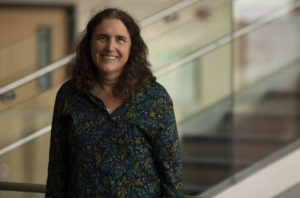Since 1987, four University of Wisconsin–Madison faculty members have been honored for their substantial contributions to research, teaching and service with the prestigious Hilldale Award. The 2022 winner in the biological sciences is Anna Huttenlocher, MD, the Anna Ruth Brummett Professor of Pediatrics, Division of Allergy, Immunology, and Rheumatology. The Secretary of the Faculty recognized Huttenlocher and fellow Hilldale winners at the Faculty Senate meeting on Monday, April 4.

In the 23 years Anna Huttenlocher has been a UW–Madison faculty member, she has established herself as a prodigious research scientist, investigating cell migration and its relationship to disease progression and immune processes with her research group. She is a compassionate clinician to her pediatric patients with autoimmune disorders, and she is recognized as a strong advocate for mentorship in the Medical Scientist Training Program (MSTP), which she led as associate director from 1999-2012 and as director from 2012 to January of this year. MSTP’s mission to integrate scientific research training with clinical practice culminates in dual MD and PhD degrees. The program is well regarded for its excellence and for Huttenlocher’s leadership.
UW–Madison has honored Huttenlocher many times: with the H. I. Romnes Award for beginning faculty, the Kellett Mid-Career Award, a Vilas Distinguished Achievement Professorship, and most recently in 2020 with the WARF Named Professorship, one of the highest honors UW bestows. Huttenlocher named her professorship the “Anna Ruth Brummett Professor of Pediatrics and Medical Microbiology and Immunology” to honor her teacher and mentor at Oberlin College, who promoted her interest in investigating cell migration and adhesion.
Where and how cells move is a critical aspect in many diseases, including cancer, heart disease, asthma, and arthritis. This became the focus of Huttenlocher’s pioneering research at UW–Madison. Her innovative investigations into how cells move and adhere in cell migration have revealed essential regulators of cell movement, applicable to cancer cells and to T-cells. The discoveries have informed others’ pharmacological approaches for anti-inflammatory therapies.
Perhaps the most transformative among Huttenlocher’s research advances has been the use of transparent zebrafish to study the biology of neutrophils—one type of white blood cell crucial to immune response— and wound healing. Zebrafish’s natural transparency allows Huttenlocher to conduct experiments in vivo. The lab generated the first transgenic zebrafish with a green fluorescent protein within its neutrophils so that their movements out of and back into vasculature could be easily tracked within the living fish. Her investigations upended a long-accepted but untested hypothesis that neutrophils resolve inflammation by dying in the area and being removed by macrophages. Huttenlocher showed that the presence of macrophages in the area induce the neutrophils to migrate back, through a chemical signaling pathway.
“No one believed us at first,” recounted Huttenlocher. “Then they saw the video of the fluorescent neutrophils migrating back from the wound area within the living zebrafish.”
Her research group has also developed zebrafish models of human immune disorders, investigating how cells crucial in immune response can also cause illness. Department of Pediatrics Professor and Chair Dr. Ellen Wald noted, “Her work in this area has great potential to provide new insights into the pathogenesis and treatment of inflammatory disorders in human immunodeficiency.”
Huttenlocher’s research has secured substantial funding, with continuous NIH support since 1997. She has published more than 200 articles in prestigious journals, and she has an exceptional H-index value—a measure of the cumulative influence of an author’s scholarly production and citation by others—of 70.
Mentorship has been an essential aspect of Huttenlocher’s career throughout. Her mentor at Oberlin College, Dr. Anna Brummett, helped clarify Huttenlocher’s vision and enabled her to take the right steps. As Associate Director and Director of the MSTP at UW–Madison, Huttenlocher had the means to guide others in research. “I try to listen, to learn what the students think they want to do. It may be a very hazy idea,” she explained. “I can then provide a kind of map to the territory, show possible pathways, make suggestions, point them toward opportunities.
Huttenlocher’s research group, a close-knit team of 14 research scientists and five to six undergraduates, includes two who have been with her for more than a decade: David Bennin and Julie Rindy. Amid all the accolades, she is quick to spread the praise around: “I have very good people around me —you’re only as good as your whole team.”